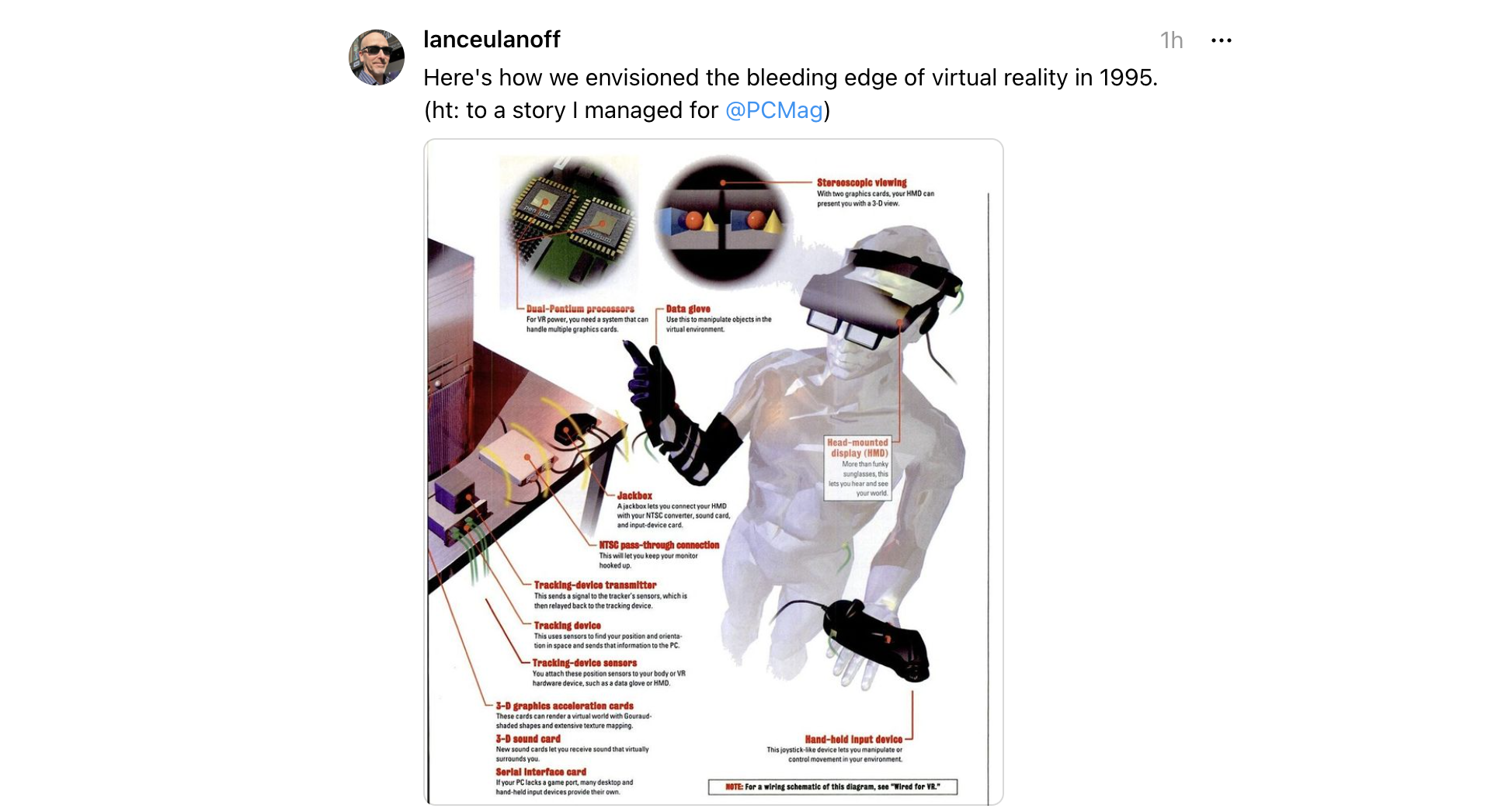Even the Metaverse didn't make you VR converts. You don't love VR and that's a huge problem for Meta and virtual reality
Why don't you love VR?

Sign up for breaking news, reviews, opinion, top tech deals, and more.
You are now subscribed
Your newsletter sign-up was successful
Virtual reality is in trouble. Not the digital realm that begs us to inhabit it but the real-world business of virtual reality that relies on billions of flesh and blood people buying VR headsets and spending millions on deeply immersive software.
A recent CNBC report on the declining fortunes of Meta's VR business has me wondering if we'll ever embrace virtual reality and its pushy stepbrother, The Metaverse.
I've been on this ride before, back almost 25 years ago when the mid-1990s was filled with just powerful enough Pentium PCs, Matrox graphics cards, some semi-decent controllers, wearable and constricting sensor technology, and oversized VR helmets and cheesy stereoscopic vision visors. Taken together, it was almost sufficient computational power, input prowess, and display capability to give you a low-resolution (640x480) view of a virtual environment you could look at and, if you knew how to use Logitech's CyberMan 3D Controller, move about in.
In a 1995 feature I managed for PC Magazine, the authors breathlessly wrote that "Virtual-reality tools let you experience all kinds of 'realities' without ever leaving your office. Imagine taking flying lessons without ever leaving the ground, practicing surgery without stepping into an operating room, or modeling data by grabbing it with your hand and moving it around in 3-D space."
Exciting, right?

Despite the nascent software and environments, and the explosion of first-gen and sometimes painful-to-wear hardware, consumers (and businesses) showed almost zero interest in virtual reality and by the turn of this century, most VR companies and their products were gone.
This second go-round is nothing like the first time. I can tell you from experience that a Meta Quest Pro or even Meta Quest 3 bears no resemblance to the Forte Technologies VFX1 HMS I tried out in 1995. That thing was giant, heavy, and painful to wear, and the visuals gave me headaches.
Sign up for breaking news, reviews, opinion, top tech deals, and more.
I've worn most of the major VR headsets offered by Meta, HTC, Magic Leap, and others and can offer them generally nothing but praise. Whether I'm using them in fully immersive mode or for augmented reality, the experience is exciting, fun, and sometimes emotional (see Apple's new Vision Pro headset and the Spatial video experience).
There is, though, another truism about most of my various VR headgear experiences: After the initial blush of excitement, I usually stop wearing them, often forgetting about them for months at a time.
Granted, I'm not a gamer who might find hours, days, even weeks spent inside a virtual gaming arena pleasurable and, if they're pro gamers, maybe profitable. Gamers, though, are still the outliers. They (and adult content consumers) might drive the current VR market, but average consumers are not along for the VR ride.
Stumbling in the real world
According to CNBC. "Sales of VR headsets and augmented reality glasses in the U.S. plummeted nearly 40% to $664 million in 2023, as of Nov. 25, according to data shared with CNBC by research firm Circana." Worse yet, the fall appears to be accelerating year-over-year.
Facebook Founder and current Meta CEO Mark Zuckerberg has made and continues to make a multi-billion-dollar bet on VR and believes so deeply in his immersive world of the future – the Metaverse – that he renamed his company and appears hell-bent on making VR a thing for all consumers.
The problem is that no one is buying what Zuckerberg is selling and consumers are not becoming VR converts.
It would be disingenuous to claim that while I once believed in the Metaverse, I've now seen the light. I never got it, and it's become clear to me that the concept of doing everything you do in the real world while wearing an awkward helmet makes little sense to most consumers.
It's not a Holodeck, damnit
Virtual reality can't become a part of our reality until it's frictionless. It should expand our real horizons and not attempt to recreate the entire world within a fundamentally limited virtual world. I know, how can virtual be limiting? First of all, if you're wearing a helmet, you'll only enjoy the virtual world for as long as your batteries hold out. Plus, if you lose your internet connection, the virtual world could disconnect and leave you hanging in no-man's land.
The real world has no end; it's a circle, after all, and doesn't need a network to deliver you the goods.
Even people who don't know much about technology or VR know this much.
Consumers are now telling VR purveyors with their pocketbooks and wallets that they still want to experience the world unfettered by technology and that if Meta and others cannot bring exciting experiences to them that augment it in a more Star Trek Holodeck fashion, they'd just rather not.
It's bad news for Meta and might even be bad news for Apple, which is about to dive headset first into the VR and mixed reality space.
Now, I think VR in measured doses in grand, but I'm also a nerd. The challenge for all these companies in 2024 is convincing consumers that this time, they finally do want virtual reality. I wish them luck but worry they may fail until they can provide enhanced reality to consumers on terms they can accept and embrace - in the real world.
You might also like

A 38-year industry veteran and award-winning journalist, Lance has covered technology since PCs were the size of suitcases and “on line” meant “waiting.” He’s a former Lifewire Editor-in-Chief, Mashable Editor-in-Chief, and, before that, Editor in Chief of PCMag.com and Senior Vice President of Content for Ziff Davis, Inc. He also wrote a popular, weekly tech column for Medium called The Upgrade.
Lance Ulanoff makes frequent appearances on national, international, and local news programs including Live with Kelly and Mark, the Today Show, Good Morning America, CNBC, CNN, and the BBC.